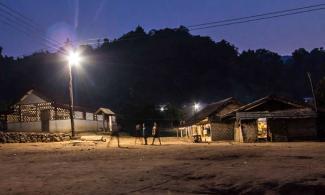
Africa and the world at large needs no reminder that Nigeria is the giant of Africa. Nigeria has the largest population with over 170 million inhabitants and the largest economy with a GDP of approximately $510 billion. Interestingly, the youth including myself account for about 70% of the population but a large percentage of those youth remain uneducated and unemployed. Regardless of our current situation, the facts mentioned above signify the potential Nigeria has as a country, however this potential can only be fully realised with critical infrastructure such as power.
As a kid, i remember the Nigerian Electricity Power Authority (NEPA) was infamously known as ‘Never Expect Power Always’, while PHCN on the other hand was referred to as ‘Please Have Candles Nearby’. These phrases are still synonymous to the erratic supply of electricity that continues to haunt us as a nation even after the unbundling and privatisation of the defunct NEPA.
googletag.cmd.push(function() { googletag.display('content1'); });
This brings me to the current state of electricity supply in Nigeria. It is important to keep in mind that there is a direct correlation between economic growth and electricity supply. Unfortunately even though power supply has improved since the ascension of the current government, a holistic view of the situation shows this growth has not been inclusive. This becomes more apparent as we move away from the capital cities. According to the Rural Electrification Agency only 26% of rural households have access to electricity. For emphasis I will rephrase, about 74% of rural households have probably never had access to electricity. This isn't just a statistic, there are several communities in Nigeria that still live in darkness. One of such communities among others is called Ungwar Buzu of Makarfi Local Government Area in Kaduna State, which has never been connected to the national grid. Majority of Nigerians i believe can identify with this unpalatable situation. Moreover, there are six degrees of separation, we all have relatives, friends and acquaintances who live close to similar communities so the veracity can easily be confirmed.
For the large percentage of Nigerian citizens living in such communities, life is a daily toil. Basic amenities associated with electricity are absent. As a result, they still rely on fuelwood and kerosene as a primary source of energy, which further exposes them to various health issues due to smoke inhalation. Such communities remain disconnected from the national grid or rather have never been connected to the grid, and as unfortunate as it sounds, these communities will likely remain disconnected as electrification comes with high capital cost that has to be justified by return on investment for a typical investor. This immediately puts such communities at a disadvantage as paying high metering rates is unattainable.
With the reality enumerated above, there needs to be a paradigm shift in Nigeria’s approach to rural electrification and power supply as a whole. Renewable energy has provided us with a unique opportunity to leverage on these problems in order to turn them into an opportunity. However, renewables are not an immediate replacement nor competition for conventional energy but rather a complimenting power source than can ease the reliance on our volatile transmission lines and fossil fuel power plants especially in times of falling oil prices.
googletag.cmd.push(function() { googletag.display('content2'); });
Interestingly, as the price of oil has dropped, the price of solar has dropped as well. According to the International Renewable Energy Agency (IRENA), Solar PV module prices have dropped 75% since 2009 and continue to decrease. This marks a point in time where solar can be classified as a commercially viable alternative source of power. However, even though renewables may be capital intensive, they are equally sustainable as operational costs are almost non-existent or rather incomparable to conventional fossil fuel power.
In conclusion, the grid needs to be decentralised at a State level so that rural communities can remain disconnected but still have access to power through the use of renewable Distributed Energy Resources (DER). These resources such as solar power stations can be used to generate power at point of need and lay the foundation for rural communities to eventually transition into a smarter and more efficient mini grid. DER’s will not only provide a work around to the high capital cost of electrification but also enable us embed generation thereby avoiding transmission losses through the national grid as power is generated and used onsite with negligible operating cost.
Even though this will not bring complete stability to the national grid as a whole, it will act as a buffer that will enable distribution companies to focus their energy on industrialisation. This will go a long way in addressing the disparity among the disconnected for power remains as non-existent as it has ever been for rural communities and those citizens are only but victims of circumstances or rather victims of location. However, as Nigerians we have to remember we are all one and are only as strong as our weakest link.
I believe the pragmatic step mentioned above will help bring about the change countless youth in Nigeria have longed for, especially those that are in touch with their roots. I urge the Government to bridge the gap between the metropolitan areas and rural communities in terms of power supply. This will not only increase the standard of living for rural dwellers but also put them in a better position to achieve economic prosperity. I urge again that we must not forget that there is a direct correlation between economic growth and electricity supply. Our electricity development efforts must be inclusive and in a manner that gives hope to the rural communities who have remained unheard or perhaps forgotten.
#lightUpRuralNigeria
googletag.cmd.push(function() { googletag.display('comments'); });